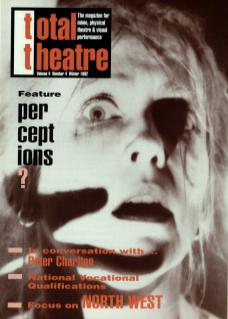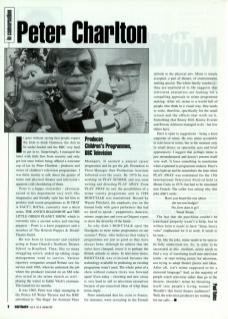It goes without saying that people expect the Irish to drink Guinness, the Arts to be under-funded, and the BBC very hard to get into. Surprisingly, I managed the latter with little fuss from security and only got lost once before being offered a welcome cup of tea by Peter Charlton: producer and writer of children's television programmes. I was there mainly to talk about the genres of mime and physical theatre and television's apparent cold-shouldering of them.
Peter is a happy storyteller – obviously suited to his department very well. His imaginative and friendly style has led him to produce such recent programmes as Is That a Fact?, Bitsa, currently into a third series, The Antiques Roadshow and The Little Green Planet Show, which is currently into a second series and starring puppets – Peter is a keen puppeteer and a member of The British Puppet & Model Theatre Guild.
He was born in Lancaster and studied acting at Esme Church's Northern Theatre School in Bradford. Then, like so many struggling actors, ended up taking stage management work to survive. Various repertory companies around Britain saw his service until 1963, when he undertook the job where the producer insisted on an SM who acted in the mime sketch as well – playing the waiter to Eddie Vitch's customer. This lasted for six months.
It was 1965, Peter was stage managing at the Prince of Wales Theatre and the BBC advertised in The Stage for Assistant Floor Managers. It seemed a natural career progression and he got the job. Promotion to Floor Manager then Production Assistant followed over the years. By 1970 he was working on Play School and was soon writing and directing Play Away. From Play Away he saw the possibilities of a mime variety programme and in 1989 Bodytalk was transmitted. Hosted by Wayne Pritchett, the emphasis was on the human body with guest performers that had no need to speak – puppeteers, dancers, mimes, magicians and even an Origami expert to show the dexterity of the hands.
So why didn't Bodytalk open the floodgates to more mime programmes on our screens? Peter, who believes that today's programmes are just as good as they have always been, although he admits that the styles have changed, traces it to perhaps the British attitude to mime. In television terms, Bodytalk was criticised because the technology available in producing an exciting programme wasn't used. The whole point of a show without camera tricks was frowned upon! Even today – clowning and new circus is very hard to sell to television executives because of pre-conceived ideas of what these terms imply.
Peter mentioned that his visits to France, for instance, were revealing in the French attitude to the physical arts. Mime is simply accepted, a part of theatre, of entertainment, nothing special. The whole family watches it; they are unafraid of it. He suggests that television executives are looking for a compelling approach to mime programme making. After all, mime is a world full of people who think in a visual way. One needs to write, therefore, specifically for the small screen and the effects that work on it. Something that Benny Hill, Kenny Everett and Rowan Atkinson managed to do – but few others have.
Peter is open to suggestions – being a keen supporter of mime. He sees mime as acceptable in television in terms, but at the moment only in small doses: as speciality acts and brief appearances. I suggest that perhaps mime is just misunderstood and doesn't present itself very well. It loses something in translation when explained to programme-makers. Peter's eyes light up and he remembers the time when Play Away was nominated for the 15th International Television Festival held in Monte Carlo in 1975, but had to be translated into French. The caller was asking why this joke didn't work:
Have you heard the one about the ten-ton budgie?
No, how does it go?
Tweet Tweet.
The fact that the punchline couldn't be translated properly wasn't a help, but in written form it needs to have ‘deep, heavy voice’ emphasised for it to work. It needs to be seen...
Yet, like the joke, mime needs to be seen to be fully understood too. So, in order to be successful in this medium, mime needs to find a way of translating itself into television terms – to start writing purely for television, not trying to adapt theatre pieces and ideas. After all, isn't mime supposed to be a universal language? And, as the majority of people watch television rather than go to the theatre, shouldn't mime be thrusting itself into people's living rooms? Wouldn't that boost theatre audiences? Well, the television producers are waiting for our calls…

